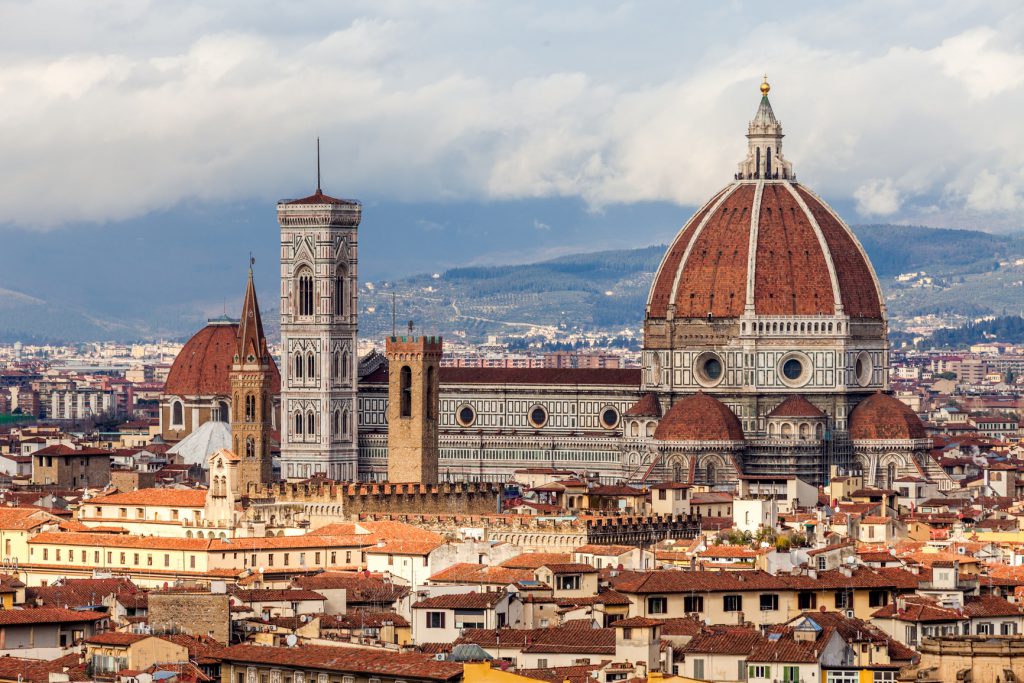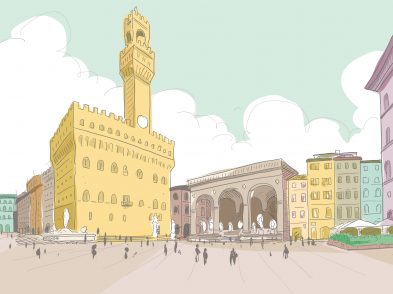As English speakers, we refer to the city of Florence as just that: Florence. Yet, many people will also be aware that the Italian name for the city is different. Here, it is known as Firenze. Over time, many different names developed in reference to the city, both in Italian and in other languages. So, what does Firenze mean? Where did the name come from? And why do English-speakers call it Florence?

History of the city
The city of Florence was founded sometime in the 1st century BC as a military settlement for Roman soldiers. The settlement, which had existed before the Romans founded the city, may have been called Fluentia, which likely came from the way two rivers, the Arno and the Mugnone, met nearby. However, when the Romans built the city, Florence was known as Florentia. With the foundation of the city happening so long ago, it is impossible to know for certain how this original name came about, though we know the meaning and development of the word itself. Florentia comes from the verb florere, meaning ‘to bloom’, created by combining the present participle, florens or florentis, meaning blooming, with the suffix ‘ia’ which was used in the formation of geographic words, as seen in Italia, Grecia and Sicilia for example. However, the reasoning behind this choice is more obscure, and ideas include the abundance of flowers in the area at the time, or the fertile lands (named florentes in Latin) on which the city was built. There is also a popular theory that Floralia, a popular Roman festival meant to honour Flora, the goddess of flowers, may have coincided with the foundation ceremony of Florence and therefore lent its name. However, the Latin word florere could also be used figuratively to mean ‘prosperous’ so the name may have been less literal and had more of an auspicious reasoning. However, there is no certainty to any of these theories, and no firm conclusions have been made about the exact origins of the name.
Regardless of its origins, this Latin name Florentia is the root of words in other nearby languages. The natural changes in pronunciation came from alterations both orally and in print. Oral alterations come from foreigners hearing the name and forming close phonetic approximations of pronunciation in their own language. Written alterations come from readers pronouncing words in a way that makes sense in their native language, and then writing it down in this altered way. Alterations such as these led to the word for the city being changed in different languages, with the city becoming Florencia in Spanish, Florenz in German, and Florence in English and in French.
Why Firenze?
What about the word Firenze, the Italian name for the city? As with all the other modern words for Florence, the word Firenze has its roots in the Latin name Florentia. In Old Italian, through the natural changes that take place during the development of language and pronunciation, this name became Fiorenza. The changes that took place in local vernacular language meant that lots of different words were used in different areas of Tuscany, with the first examples Firenze-type words being found in the middle of the 13th century, with dialects using words such as Firence, Firenzzie and Firense, although Fiorenze-type words were also used in other areas. It is easy to see how through simplification and standardisation, Fiorenza and its derivatives became the modern Italian Firenze over time.
Not only a city
The word Florence is not only the name of a city, however, it is also a popular name for people. Its origins as a name come from the Latin name Florentius, which was borne by a few early Christian saints, and was therefore sometimes used in their honour thoughout the Medieval era. In both English and French, this Latin name developed into the name Florence, and though it has not always been a popular name, and at first was used mostly for men, over time popularity has increased, especially among girls. One reason for this was Florence Nightingale, who was named after the city of Florence after she was born here in 1820. She became famous after the Crimean War and was considered the founder of modern nursing, and this fame and reputation meant many English people began naming baby girls after her, making the name popular. Today, Florence is experiencing a resurgence in popularity, being the 8th most popular baby girl name in the UK in 2021, and also increasing in popularity in the US (though to a lesser extent).








